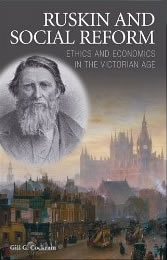Dr Gill Cockram, BA, MA, PhD (London) FRHistS |
|
Gill Cockram - Research interestsRuskin’s influence on nineteenth century economic and political theorists: Publications include:Papers given on aspects of Ruskin’s social and intellectual thought at the Institute of Historical Research in London, Italy, Lancaster University, University of Sheffield and New Lanark. Review of Michael H. Lang’s book, Designing Utopia: John Ruskin’s Urban Vision for Britain and America (Black Rose, 1999), for the Utopian Studies Society and the entry on Ruskin for the Encyclopedia of Nineteenth – Century Thought (Routledge, December 2005, pp. 410-14). Further publications include a paper entitled ‘Hierarchical Utopias: Ruskin’s fear of Democracy’ published August 2005 in the Journal of Generalism and Civics. This was a paper given at 6th International Conference of the Utopian Studies Society on Utopias and Globalisation. Also an article entitled ‘Fourier and the English Christian Socialists’ translated into French for the Cahier Charles Fourier published in June 2008. Ruskin Birthday Address, ‘The Interpretation of History in Ruskin’s Social Thought’, 8 Feb. 2009, Church of St Bartholomew the Great, Smithfield, London. Published in The Ruskin Review and Bulletin, Vol. 5, No. 2, pp. 5-15. Review of Stuart Eagles' book After Ruskin: The Social and Political Legacies of a Victorian Prophet, 1870 - 1920 (Oxford University Press, 2011), published in the online journal The Eighth Lamp: Ruskin Studies Today, No. 6. Articles on Ruskin and Christian Socialism in G. Claeys (Ed) Encyclopedia of Modern Political Thought, C.Q Press (2013).
Contact: |
|
 Review
Review